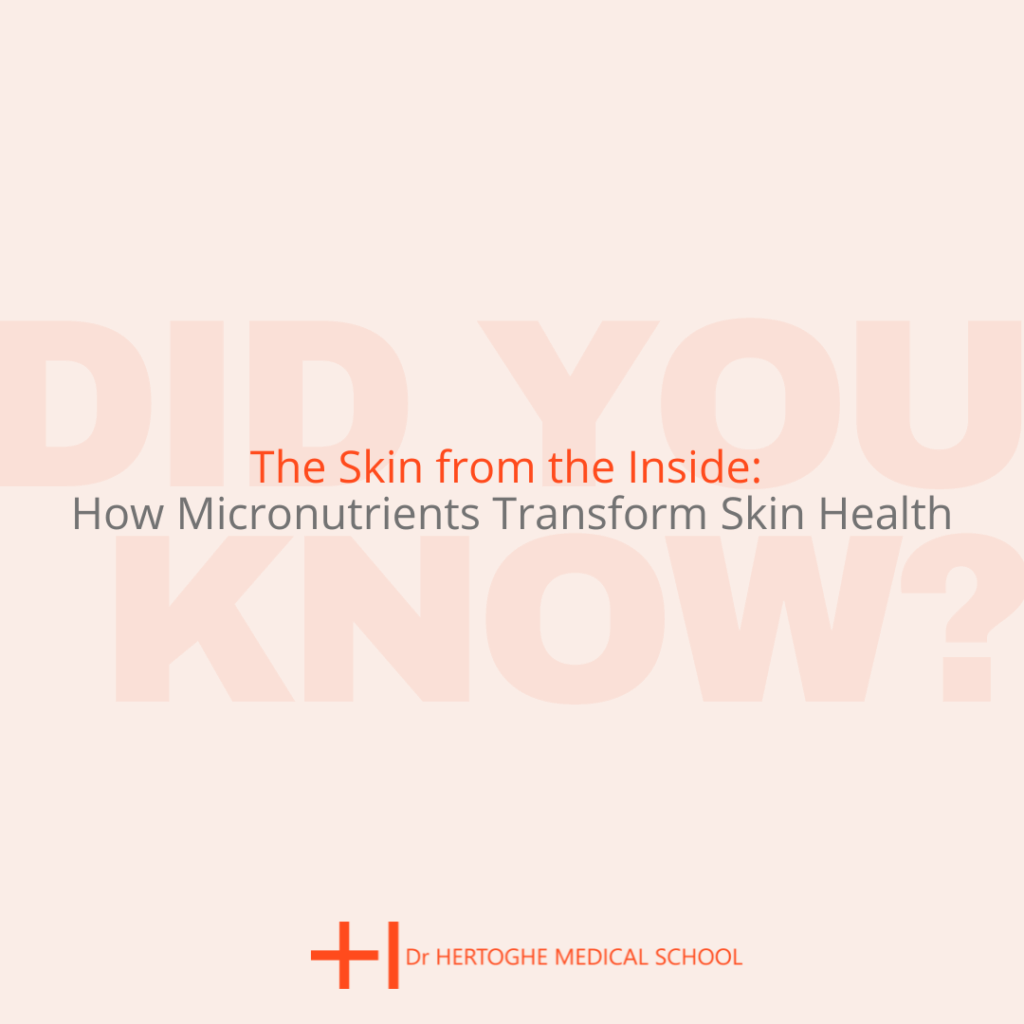The Skin from the Inside: How Micronutrients Transform Skin Health

How Micronutrients Transform Skin Health
Healthy, radiant skin is not only the result of what we apply externally, it is profoundly shaped by what happens within. Advances in nutritional and hormonal medicine have revealed that micronutrients play a crucial role in maintaining and restoring skin health. Vitamins, peptides, antioxidants, and trace elements act from the inside out to strengthen the skin’s structure, boost its defenses, and slow visible aging. Several key nutrients have been clinically proven to improve the skin’s appearance and resilience: they can reduce hyperpigmentation and age spots, smooth wrinkles and enhance elasticity, increase hydration and firmness, and reinforce repair and protection against photodamage.
Pycnogenol: Protection and Renewal
Pycnogenol, a natural extract from French maritime pine bark, is one of the most potent antioxidants known. It protects collagen and elastin fibers from enzymatic degradation, reducing skin sagging and wrinkle formation. Studies show that Pycnogenol can decrease hyperpigmentation, enhance elasticity, improve hydration, and strengthen resistance to UV-induced damage. It also supports wound healing and reduces scar formation, making it a key nutrient in anti-aging and regenerative skin therapies.
Melatonin: The Night Guardian of the Skin
Melatonin is not only a sleep hormone, it’s also a multifunctional antioxidant that regulates skin physiology. Topical melatonin has been shown to reduce redness, lighten melanin spots, and decrease coarse wrinkles, improving overall skin aging scores. When used both orally and topically, an “In & Out” approach, melatonin enhances hydration, doubles wrinkle reduction, and improves skin lipid profiles, leading to a stronger and more resilient skin barrier.
Vitamin B12: Brightening and Balancing
A deficiency in vitamin B12 can manifest as hyperpigmentation and melasma-like spots. Supplementation restores normal pigmentation, harmonizes skin tone, and supports the nervous and hematopoietic systems, indirectly promoting healthier, more vibrant skin.
Collagen Peptides: Restoring the Skin’s Architecture
Collagen represents about 75% of the skin’s structure, but its synthesis naturally declines with age, leading to sagging and wrinkles. Oral collagen peptides have been clinically shown to improve hydration, elasticity, and firmness, while reducing fine lines. They also stimulate fibroblast activity, the skin’s collagen-producing cells, helping to rebuild the dermal matrix and maintain youthful structure.
Hyaluronic Acid: The Hydration Molecule
Hyaluronic acid has a remarkable capacity to bind and retain water within the skin. Oral supplementation significantly improves hydration, tone, and thickness. Clinical studies demonstrate visible reductions in fine lines and a stronger skin barrier after consistent intake, making it an essential component of inside-out skincare regimens.
Zinc: Repair and Regeneration
Zinc is indispensable for tissue repair and skin health. Deficiency leads to dryness, scaling, and delayed wound healing. Supplementation helps restore hydration, smoothness, and resilience. Topical zinc-copper formulations also stimulate elastic fiber regeneration, complementing systemic therapy and enhancing overall skin texture.
By integrating these nutrients into clinical practice, healthcare professionals can help patients rejuvenate their skin naturally, delay visible signs of aging, and strengthen their skin’s protective barrier. The future of dermatology and longevity medicine lies not only in topical treatments and procedures, but also in nutritional and hormonal strategies that restore vitality at the cellular level. Healthy skin begins within, and by nurturing it from the inside, we unlock its full potential for beauty, strength, and resilience.

